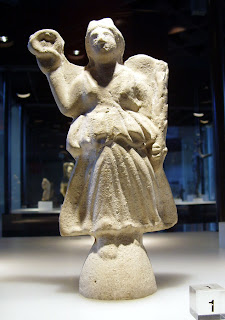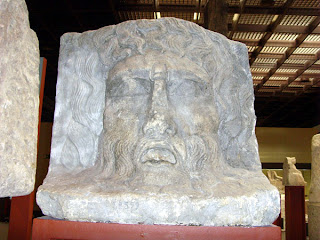 'Victoria was considered the embodiment of victory.' So read the sign beside this Roman figurine. I instantly liked the figurine. (If you read a description like that with your name in it, vanity tends to kick in.) The figurine dates to the 2nd Century AD and is a representation of the Roman goddess Victoria. It belongs to Cologne's excellent museum of Roman life, the Römisch-Germanisches Museum.
'Victoria was considered the embodiment of victory.' So read the sign beside this Roman figurine. I instantly liked the figurine. (If you read a description like that with your name in it, vanity tends to kick in.) The figurine dates to the 2nd Century AD and is a representation of the Roman goddess Victoria. It belongs to Cologne's excellent museum of Roman life, the Römisch-Germanisches Museum.And that, dear reader, is my cue for a little history lesson. Those who tire easily may want to take a little pause just now, to build up energy stores...
The museum was built on the walls of an old Roman villa of about 200 AD, which was discovered in 1941, when workers were digging an air raid shelter.
 Within the boundaries of the villa is a fantastic Roman mosaic featuring scenes from the world of Bacchus, Roman god of wine and intoxication (must have been a fun chap to invite to a party). It is about 70 square metres in size and is made from over a million pieces. The mosaic is very well preserved: when the city was sacked by barbarians in the 4th Century AD the wreckage of the villa fell on the mosaic and protected it from damage over the centuries. In the first photo of the mosaic you can see a couple dancing and in the second a pair of birds hold a cup of wine.
Within the boundaries of the villa is a fantastic Roman mosaic featuring scenes from the world of Bacchus, Roman god of wine and intoxication (must have been a fun chap to invite to a party). It is about 70 square metres in size and is made from over a million pieces. The mosaic is very well preserved: when the city was sacked by barbarians in the 4th Century AD the wreckage of the villa fell on the mosaic and protected it from damage over the centuries. In the first photo of the mosaic you can see a couple dancing and in the second a pair of birds hold a cup of wine.
The museum houses a fabulous collection of Roman artefacts, including stunning pieces of locally made jewellery and glass, household items and reliefs from buildings. According to the Rough Guide to Germany, the museum's Roman glass collection is reckoned to be unsurpassed in the world. Indeed, Cologne developed as a centre for the manufacture of luxury glass from the 1st Century AD.

So, now for a little bit about Cologne's origins. Perhaps you'd like to get yourself a brew?
Cologne was founded by the Romans in 37 BC. In 50 AD its status was raised to that of a 'colonia', the Roman term for a city, by Emperor Claudius. It was given the full title 'Colonia Claudia Ara Agrippinensium' after Claudius and his new wife Julia Agrippa (she was from Cologne, so Claudius was buttering her up by raising the status of her home town). The name of the city exists today in the form of 'Cologne'.
 Cologne was the capital of the province of Germany Inferior. The position of Cologne on the Rhine gave it two great advantages: the Rhine provided a natural border against attack from hostile tribes on the opposite bank and also provided opportunities for ship based trade. In fact the Rhine was so important to the city that it became personified as a god. This mask, in the museum, is of a river god, possibly a personification of the Rhine.
Cologne was the capital of the province of Germany Inferior. The position of Cologne on the Rhine gave it two great advantages: the Rhine provided a natural border against attack from hostile tribes on the opposite bank and also provided opportunities for ship based trade. In fact the Rhine was so important to the city that it became personified as a god. This mask, in the museum, is of a river god, possibly a personification of the Rhine.Here endeth the lesson...for now!


1 comment:
Interesting stuff Vicky. I'm reading this on the district line and people next to me taking a sneaky peek must think I'm very intelligent to be swoting/ swatting (sp?) up on Roman history on my way to work. It certainly beats the free Metro!
Post a Comment